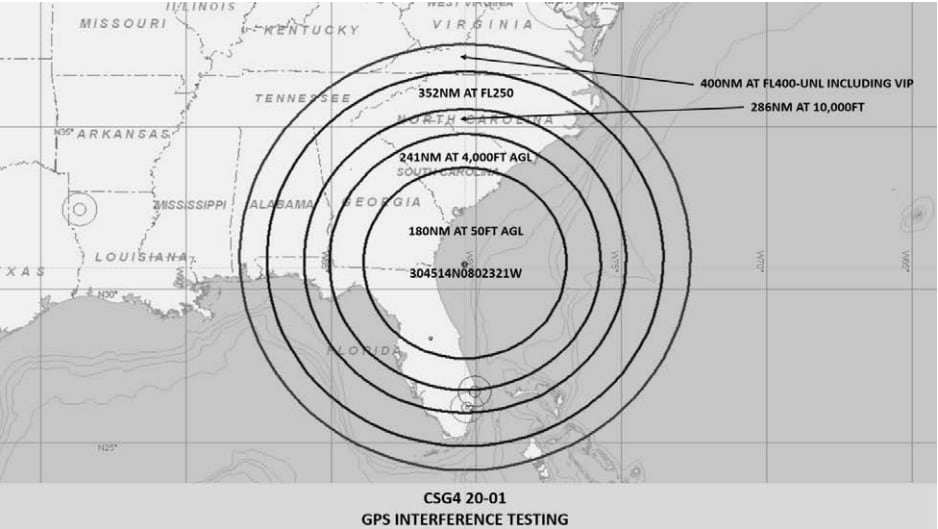Pilots flying over the southeast United States and the Caribbean may experience “unreliable or unavailable GPS signal” throughout January, according to a flight advisory from the Federal Aviation Administration.
The U.S. Navy’s Carrier Strike Group Four out of Naval Station Norfolk, Virginia, will be conducting training exercises off the coast of Georgia, affecting GPS and associated navigation systems from Jan. 16 to Jan. 24.
The disruptions will occur as low as 50 feet above ground level within 207 miles of the testing location and as high as 40,000 feet within 460 miles. The FAA is encouraging pilots to “report anomalies” and frequently check Notices to Airmen (NOTAMs) for the most recent updates.

According to the U.S. Coast Guard’s Navigation Center, the federal government “is required to conduct GPS tests, training activities, and exercises that involve interfering with GPS receivers.” In early February 2019, Carrier Strike Group Four conducted similar GPS interference testing in the same area.
Through Jan. 30, there are additional flight advisories issued for similar GPS interference testing exercises out of Fort Hood, Texas, Yuma Proving Grounds, Arizona, Cannon Air Force Base, New Mexico, and Fort Bragg, North Carolina.
“The Global Positioning System (GPS) constellation is provided by the Department of Defense (DoD). Routine testing is conducted on the GPS,” said an FAA representative. “The FAA issues advisories to inform operators that they may experience interference with or disruption of their GPS navigation systems in the vicinity of the testing.”
These exercises are likely part of a continuing emphasis on confronting emerging threats in the electronic warfare realm. Military officials and defense industry leaders have grown increasingly weary about interference with position, navigation and timing services.
Near-peer adversaries like China and Russia have developed robust capabilities, including allegedly jamming GPS at a NATO exercise in 2018. North Korea, Iran and even non-state actors have also developed extensive GPS-related jamming capabilities.
"We understand there are jamming threats that can overpower the [GPS] receiver. That’s always been a known threat,” said James Miller, executive director of the National Space-Based PNT Advisory Board. “Then there’s spoofing — a little bit more complicated — where you can actually misguide or take someone off their route and they won’t even be aware of it. And finally, we’re being faced with a type of hacking, or smart spoofing, where some of the computer systems that run on GPS are actually manipulated.”
As these tests become increasingly necessary, concerns over civilian pilot safety remain.
“There can be safety of flight issues as a result of this military activity so pilots should be extra vigilant when flying in the affected area,” said Rune Duke, senior director of air traffic and aviation security at the Aircraft Owners and Pilots Association (AOPA). “Intentional jamming of GPS signals affects many aircraft systems, including navigation and surveillance, which is highly concerning given most aircraft use GPS as the primary means of determining their position."
AOPA, a not-for-profit organization for general aviation, reported that 64 percent of surveyed pilots expressed concern over GPS interference by the military.
The Coast Guard acknowledges the potential risks associated with GPS interference tests, but “only safety-of-life/safety-of-flight issues will warrant cancellation or postponement” due to significant logistical and interagency planning needed to conduct such a large exercise, according to their website.
“Carrier Strike Group FOUR (CSG-4) conducts academic, synthetic and live training, which includes GPS testing, during exercises to create a realistic training environment so that our ships and crews can effectively operate across all domains in a contested environment,” said Cmdr. Charles Drey, public affairs officer with CSG-4. “As with all exercises, we closely coordinate with the FAA for safety, as well as exercise support, and we have received FAA concurrence during the planned operational timeframes.”
The FAA advisory expires at the end of this month.
Dylan Gresik is a reporting intern for Military Times through Northwestern University's Journalism Residency program.





